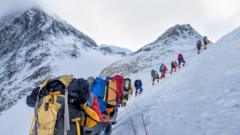Nepal's Department of Tourism revealed a 36% increase in fees, now at $7,500 for the off-peak season (September to November) and $3,750 from December to February. This price adjustment is primarily aimed at generating more revenue for the country, which relies on tourism for roughly 4% of its economy. Despite these changes, experts worry about the high number of climbers, with approximately 300 permits issued annually.
Director General Narayan Prasad Regmi stated that the permit rates had not been evaluated in years, emphasizing the long-overdue update. As of April 2024, Nepal's Supreme Court mandated the government to cap mountaineering permits on Everest to mitigate overcrowding, though no specific limits were set.
Concerns about dangerous conditions due to climber traffic have also prompted efforts from the Nepalese army to clean up the mountain, which has been dubbed "the world's highest garbage dump." So far, over 119 tonnes of trash and numerous human remains have been collected during clean-up initiatives. Despite this, estimates suggest around 200 bodies may still be on the mountain, highlighting the ongoing challenges of maintaining Everest as a safe and sustainable climbing destination.
Director General Narayan Prasad Regmi stated that the permit rates had not been evaluated in years, emphasizing the long-overdue update. As of April 2024, Nepal's Supreme Court mandated the government to cap mountaineering permits on Everest to mitigate overcrowding, though no specific limits were set.
Concerns about dangerous conditions due to climber traffic have also prompted efforts from the Nepalese army to clean up the mountain, which has been dubbed "the world's highest garbage dump." So far, over 119 tonnes of trash and numerous human remains have been collected during clean-up initiatives. Despite this, estimates suggest around 200 bodies may still be on the mountain, highlighting the ongoing challenges of maintaining Everest as a safe and sustainable climbing destination.























